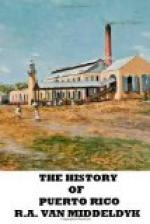“Here now how the Tribunal proceeded with the offenders. When an accusation was made, the accused were taken to a secret prison without being permitted to communicate with parents, children, relations, or friends, till they were condemned or absolved. Their families were denied the consolation of weeping with them over their misfortunes or of assisting them in their defense. The accused was not only deprived of the assistance of his relations and friends, but in no case was he informed of the name of his accuser nor of the witnesses who declared against him; and in order that he might not discover who they were, they used to truncate the declarations and make them appear as coming from a third party.
“Some one will be bold enough to say that the rectitude and the religious character of the inquisitors prevented the confusion of the innocent with the criminal; but the experiences of many years and the history of the Inquisition give the lie to such assurances. They show us sage and saintly men in the Tribunal’s dungeons. Sixtus IV himself, who, at the request of the Catholic kings, had sanctioned the creation of the Tribunal, complained strongly of the innumerable protests that reached him from persecuted people who had been falsely accused of heresy. Neither the virtue nor the position of distinguished men could protect them. The venerable Archbishop of Grenada, formerly the confessor of Queen Isabel, suffered most rigorous persecutions from the inquisitors of Cordova, and the same befell the Archbishop of Toledo, Friar Louis de Leon, the venerable Avila, Father Siguenza, and many other eminent men.
“In view of these facts, it is no paradox to say that the ignorance, the decadence of science, of the arts, commerce and agriculture, the depopulation and poverty of Spain, are mainly due to the Inquisition.
“How the Inquisition could be established among such a noble and generous people as the Spanish, will be a difficult problem for posterity to solve. It will be more difficult still to explain how such a Tribunal could exist for more than three hundred years. Circumstances favored its establishment. It was introduced under the pretext of restraining the Moors and the Jews, who were obnoxious to the Spanish people, and who found protection in their financial relations with the most illustrious families of the kingdom. With such plausible motives the politicians of the time covered a measure which was contrary to the laws of the monarchy. Religion demanded it as a protection, and the people permitted it, though not without strong protest. As soon as the causes that called the Inquisition into existence had ceased, the people’s attorneys in Cortes demanded the establishment of the legal mode of procedure. The Cortes of Valladolid of 1518 and 1523 asked from the king that in matters of religion the ordinary judges might be declared competent, and that in the proceedings the canons and common codes might be followed; the Cortes of Saragossa asked the same in 1519, and the kings would have acceded to the will of the people, expressed through their representatives, especially in view of the indirect encouragement to do so which they received from the Holy See, but for the influence of those with whom they were surrounded who had an interest in the maintenance of the odious institution.”




